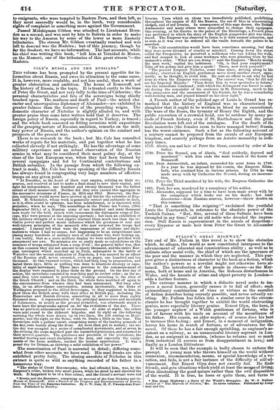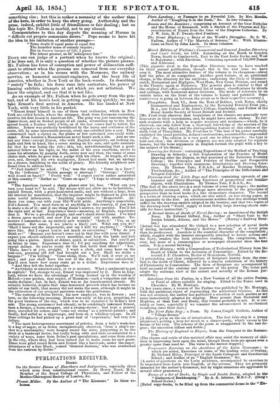PHLEGM'S GREAT HIGHWAY.*
THE end of Mr. Fullom in this novel is to show the obstacles which, he alleges, the world as now constituted .interposes to the advancement of educated and conscientious ability ; as well to indicate other social evils, the chief of which are the ignorance .of the poor and the manner in which they ruse neglected. This pur- pose gives a distinctness of character to the book as a fiction, which the author's powers as a novelist might not otherwise havfLa.t- tained. The introduction of the people in classes—as the Mor- mons, both at home and in America, the Rebecca disturbances& Wales, and the haunts of crime and abject poverty in 1..xedon- adds a further feature.
The extreme manner in which a didactic novel seeks ,to im- press a moral lesson, generally causes it to fail of effect; such extraordinary combination of vices or virtues as the moralist of fiction describes being scarcely possible, and never actually ex- isting. Mr. Fullom has fallen into a similar error in the circum- stances he has brought together to exhibit the world obstructing genius, more especially literary genius. Ernest Glyn, the hero, is the younger nephew of a Welsh gentleman of fortune, who is out of favour with his uncle on account of the mesalliance of his father. His cousin, an elder nephew, of course does his best to increase this feeling ; and Ernest, in a moment of indignation, leaves his home in search of fortune, or of adventures for the novel. Of these he has a fair enough sprinkling, as engineer's:as- sistant on a railway, as an unsuccessful literary aspirant in Lou- don,-as an emigrant in America, (whence he returns not so much from industrial ill success as from disappointment in love,) and finally as a London litterateur. It will be seen that the example is badly chosen to enforce the precept. A young man who throws himself on the world without connexion, recommendation, means, or special knowledge of a -vo- cation, and fails, is not a fair instance of the difficulty of self-ad- vancement. But Ernest Glyn does not exactly fail. He .finds friends, and gets situations which yield at least the meapsof living, often illustrating the good. naturerather than -the evil disposition of the world. It is true, he loses or quits them, and turns to
• ,The Great Highway ; a Story of the World's Struggles. By W. S Pallom Author of "The Marvels of Science,"Stc. In, three volumes. Published by Long- man and Co.
something else ; but this is rather-a-necessity of the author than of the hero, in order to keep 'the-story going. Authorship and the press, -indeed, exhibit little of friendliness or fair dealing ; but on this topic Mr. Idiom is morbid, not to say absurd. Commentators to this day dispute the meaning of Horace in " difficile eat proprie oommunia dicere." Pope seems to have hit the idea in his imitation of another passage— "Some doubt if equal pains or equal fire
The humbler muse of comedy require;
But in known images of life, I guess
The labour greater, as th' indulgence less."
Every one can judge of a portrait when he knows the original ; if he does not, it is only a question of whether the picture pleases. Mr. Fullom has force of conception and power of delineation suffi- cient to attract when the persons are removed from our everyday observation ; as in his scenes with the Mormons, the railway navvies, or humorist assistant-engineers, and the busy life of America, whether in New York or the back-woods. In describing " society " he fails ; his force runs into caricature, his power of limning exhibits attempts at art which are not artistical. We know the original, and see that it is not like.
As-an example of Mr. Fullom when he gets away from the gen- teel, and of his hero's luck in getting something quickly, we may take Ernest's first arrival in America. He has landed at New York, with very little in his pocket.
"Ernest found himself in one of those vast ordinaries, which in New York are called hotels, where the stranger, fresh from European restraints, receives his first lesson in American life. The gong was just announcing the dinner-hour, and in flocked people of all ranks, scrambling up to the well- spread board, a Yankee table d'h6te, as if the last comer had to forfeit his rations. Ernest was perfectly bewildered by the hurry and confusion of the scene, till, by some inscrutable process, every one subsided into a seat. Then commenced such a clatter on the plates as few untraioed ears could with- stand. Even. London's Mansionhouse never heard such a din. And no one lost any time—except Ernest, who with English simplicity, sat looking on, knife and fork-in hand, like a rower resting on his oars, and quite unmind- ful that he was losing the tide ; this, too, notwithstanding that a good- natured fellow on his right, in the midst of his own exertions, strove to rouse his attention, by gasping forth, every now and then, the name of sonic choice dish, while he gave him a nudge with his elbow. At length, all was over, and, through his own negligence, Ernest had made but an apology for a dinner, famishing in the midst of plenty. His friendly neighbour now found time to address him.
-" 'Just landed?' he asked. 'Yes,' was the reply. Come in a liner ?'
'In the 'Jefferson.' 'Cabin passage or steerage?' ' Steerage." Pretty well found on board?' ' Pretty well.' 'I expect you're rather astonished at this country?' ' Rather so." Come on spec?' ' I hope to obtain employ- ment.'
"The American turned a sharp glance over his face. What can you turn your hand to ?' he said. 'My means will not allow me to be fastidious,' replied Ernest, with a good-humoured smile, and not without a hope, from the interest he manifested, that the inquirer might be disposed to give him
some useful information. Anything respectable." Respectable. Ah ! there you come out with your Old-World pride. Anything's respectable, Hit's honest. You must turn-to at anything in this country, if you want to make a do of it ; and if one thing doesn't answer, try another. You'll hit the right nail at last. Experience docet—meaning, in English, experience does it. We're- a go-ahead people; and can't stand about fixins. I've tried a dozen specs myself, and now I'm just twain' out with another. ',To- morrow I commence on an entirely new wrinkle." Indet.d."Yes, as an auctioneer. But come, I see you're a likely sort. What can you do ?' 'Shall I leave out the respectable, and say I will try anything ?' 'That's more like. -But I expect you're not much at calculating." Why do you think so ?' 'Because you haven't come out in that line with your dinner. I expect you should calculate every mouthful, and keep the knife and fork going like a piston. Quick at dinner, quick at calculation. But you'll get on better in time. Experience does it ; Fd pay anything for experience, except dollars. So you're ready for the first berth that offers ? " Yes.' 'Then, here's at you, straight. I want a clerk, and came here on the look-out, guessing old Jeff had brought out a few. Shall we strike a bargain?' ' I'm willing." Come along, then. We'll talk it over at say store ; and you shall have the rest of the day to practise calculation ! You'll-soon know how many cents go to a dollar. Experience does it.'
"And they left the hotel together. •
"' Aws-mixo. is RESPECTABLE, IF IT IS HONEST. What a sentiment to put in capitals! Yet, strange to say, Ernest was impressed by it. Here in Eng- land, where we have the advantage of being trained up in the worship of Moloch—your pardon, dear reader, of Mammon—such a vulgarism can only excite deron ; .but, in fact, !Ernest was so far Americanized already. He actually believed, despite that time-honoured proverb which has become an article of our faith, that-money did not make the man, although it might in the estimation of our arrogant parvenus make the gentleman. "The rostrum of Selim Driver, his -new employer, was in Bowery ; and here, OD the following morning, Ernest was early at his post, preparing for the great business of the day, which was to be signalized by &lines first sale. The young auctioneer had already, as he confidingly informed Ernest, been a farmer, a horse-swapper, and a swamp-doctor ; had kept a general store, travelled for orders, and 'come out strong' as a portrait-painter ; and finally, had sailed as a supercargo, and been on a whaling-voyage. In all these callings he had-picked up a great deal of experience,' but very few dollars.
"The most heterogeneous assortment of articles, from a lady's work-box to a bag of sugar, or as Selim metaphorically observed, 'from a ship's an- chor ton marlinspike,' were heaped round the store, purporting to he the stock of a bankrupt factor, but really being odds and ends accumulated in a variety of ways, some from Selim's past speculations, and some from stores in the city, where they had been turned out to make room for new goods. These were piled round Selim and Ernest like a barricade, under the super- intendence of a free Black, named 'General Jackson,' who was overlooked from the rostrum by Selim."



























 Previous page
Previous page